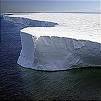What is an Iceberg?
By cuddiluk
@cuddiluk (1523)
Philippines
November 22, 2006 11:38pm CST
A mass of ice that has become detached, or calved, from the edge of an ice sheet or glacier and is floating on the ocean.
5 responses
@moneymind (10510)
• Philippines
26 Nov 06
An iceberg (a partial) loan translation from Dutch ijsberg (literally: mountain of ice),[1] cognate to Danish Isbjerg, Swedish Isberg, Low Saxon Iesbarg and German Eisberg) is a large piece of ice that has broken off from a snow-formed glacier or ice shelf and is floating in open water.
Since the density of pure water ice is ca. 920 kg/m3, and that of sea water ca. 1025 kg/m3, typically, around 90% of the volume of an iceberg is under water, and that portion's shape can be difficult to surmise from looking at what is visible above the surface. This has led to the expression "tip of the iceberg", generally applied to a problem or difficulty, meaning that the visible trouble is only a small manifestation of a larger problem.
http://www.wikipedia.org
greetings. : )
@perugu (5279)
• India
23 Nov 06
hi,its a ice block of irregular shape detached from huge static big ice mass...floating and moving towards flow..just glaceour..
@pikaapi (1744)
• India
23 Nov 06
Mountain' of floating ice on the ocean, either coming out of a glacier or an ice shelf. The largest icebergs are tabular, can be more than one hundred meters high above sea level and hundred of kilometers in diameter, taking a decade to melt. Old icebergs are smaller and tip over when they get off balance, exposing their underlayer.










